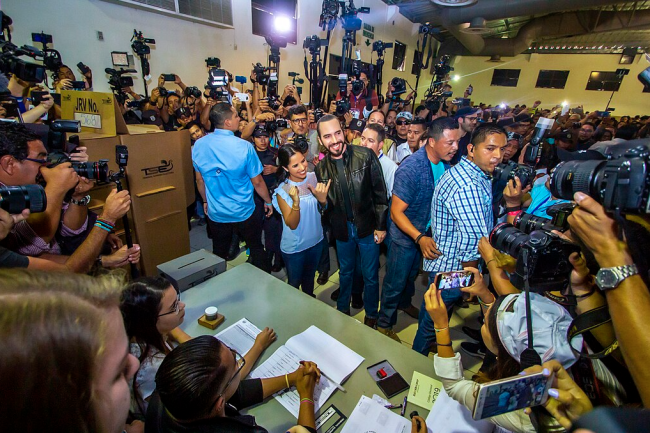by MNEESHA GELLMAN

President Nayib Bukele’s slide toward authoritarianism has culminated in an unconstitutional reelection bid. His consolidation of power has cracked down on independent press.
Nelson Rauda Zablah tries not to think of the future too much. “Because if I do,” he says, “I can’t sleep.” The 32-year-old journalist writes for El Faro, El Salvador’s most well-known online independent media outlet, and also contributes to international publications. We met in early January 2024 at a non-descript coffee shop in one of San Salvador’s numerous strip malls. Rauda’s writings and videos have explained, among other topics, Bitcoin’s inglorious path in El Salvador. In a January 2024 article for the Christian Science Monitor about President Nayib Bukele’s unconstitutional reelection campaign “Breaking the law – in a popular way?” he sums up the country’s confusing political landscape. Although nearly half the population think Bukele’s reelection bid breaks the law, Rauda writes, “a majority say they’ll vote for him.”
Bukele, a populist strongman who has systematically undone El Salvador’s fragile democracy since he was elected in 2019, is clearly barred from running for reelection under multiple articles of the Salvadoran constitution. Yet the Supreme Court—stacked with judges appointed by Bukele’s allies—cleared the way for his run. The president has crafted a concoction of justifications for the move, from citing a hidden article in the constitution that supposedly allows reelection, to staging a leave of absence from the presidency that he argues circumvents the no-consecutive-term rule. Bukele is determined to stay in power.
In a Trumpian parallel, Bukele has persistently lashed out at independent media, labeling them “fake news.” El Faro, as an independent organization unwilling to serve as a mouthpiece for the government, has been a consistent target. The discovery that Pegasus spyware had been placed on multiple El Faro journalists’ phones led to a major lawsuit and showed the extent Salvadoran actors would go to intervene in the freedom of the press. In February 2022, El Salvador’s Legislative Assembly approved a penal code reform that legitimized digital spying, all part of Bukele’s consolidation of power. Some Salvadoran journalists have fled the country.
As Rauda’s reporting shows, Bukele is expected to sweep the February 4 presidential election. With sky-high approval ratings since he declared a state of emergency in March 2022, Bukele’s lock ‘em up approach to gangs has resonated with Salvadorans exhausted from relentless violence over the last half-century. From the civil war to gang domination of many communities, collective trauma has become a political commodity in elections.
Reelection videos posted on the president’s social media platforms and making the rounds in traditional media provide emotional testimonies as to why average Salvadorans affected by gang violence stand with Bukele to say “Nunca Más”—Never Again. Coming on the heels of his state of exception tactic to break gang control by suspending constitutional rights, the media campaign appears to have been effective. Sixty-six out of every hundred Salvadorans have strong faith in the president, according to a December 2023 poll by the Instituto Universitario de Opinión Pública (IUDOP).
NACLA for more
